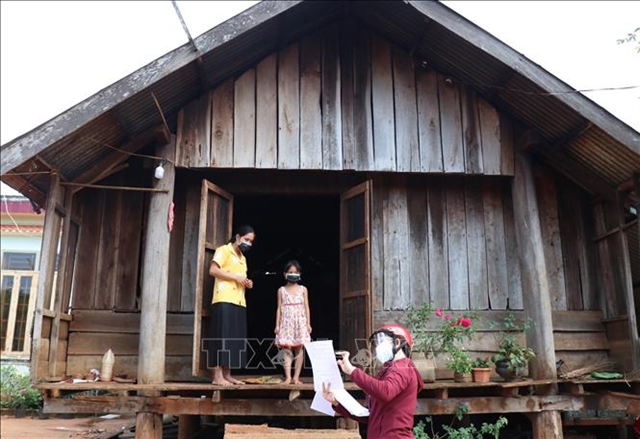 Society
Society

Đắk Lắk Province has many ethnic minorities living in remote mountainous areas where online learning is a luxury for households because they do not have computers, smartphones or a stable internet connection

|
| Lê Thị Tuyến, a primary school teacher of Đắk Lắk Province's Cư M’gar District visits a student who lacks equipment for online learning. VNA/VNS Photo Tuấn Anh |
ĐẮK LẮK – Students in Đắk Lắk Province started the new school year with online classes like millions of others nationwide due to the COVID-19 pandemic.
However, Đắk Lắk Province has many ethnic minorities living in remote mountainous areas where online learning is a luxury for households because they do not have computers, smartphones or a stable internet connection.
Online teaching and learning is therefore a challenge for both teachers and students.
According to the provincial Department of Education and Training, one of the difficulties in implementing online teaching was that many students did not have the necessary equipment.
Primary and secondary school students's ability to integrate IT with their studies was still limited. Many older teachers had not yet mastered online teaching skills.
Head of Education and Training office of Cư M’gar District, Lê Hữu Quynh said: “The 2021-2022 academic year was very special as it started when the province was under social distancing measures.”
“Online teaching was so difficult, especially in many remote areas where 50 per cent of students are ethnic minorities,” Quynh said.
“Many students did not have equipment for learning online, let alone an internet connection,” he said.
Many students also lacked textbooks because of travel restrictions in pandemic-hit areas.
Lê Thị Tuyến, a second-grade teacher at Ama Trang Lơng Primary School in Cư Mgar Commune, said: “My class has 31 ethnic minority students, only 14 of whom have equipment for online learning.”
“So, I had to go to each student’s home to teach and assign homework,” Tuyến said.
For parents, online learning was a headache when they could not afford equipment for their children.
H Brac Ayun, a mother in Cu M'gar Commune, said: “I have two children in the seventh and second grade. They do not have internet-connected equipment.”
“So, every day, the seventh grader had to go to her classmate's house to use a computer while the second grader stayed at home to wait for her teacher to give homework,” said H Brac Ayun.
“My husband and I had to work in the paddy field all day, so we just tutor her in the late evening. I was always worried that she could not keep up with the lessons,” she said.
“Now I want the pandemic to be over so that my children could go to school,” the mother said.
According to director of the provincial Department of Education and Training, Phạm Đăng Khoa, online teaching and learning amid the pandemic was really a challenge.
The department had to ensure both pandemic prevention and the continuation of studies, he said.
No child left behind
“In order to overcome difficulties and challenges in this special academic year, teachers, especially those in the remote mountainous and ethnic minority areas, must be proactive and flexible and make more efforts to maintain stability in teaching and learning, ensuring the goals in the new school year," said Khoa.
Every parent needs to accompany their children and closely co-operate with teachers, especially at the primary level.
Governments at all levels and social organisations also need to support the education sector, he said.
Y Wem H’wing, vice chairman of Cư M’gar District’s People’s Committee, said that in order to both ensure effective pandemic prevention and organise online teaching and learning, the district had directed the education sector to develop a teaching plan and be flexible to confront unpredictable developments of the pandemic.
To solve difficulties such as the lack of learning equipment and internet connections, teachers had to go to students’ homes to assign homework, he said.
Lê Thị Hải Đường, a first grade teacher at Mạc Thị Bưởi Primary School in Ea Kiết Commune, the most remote commune of Cư M’gar District, said: “Since the very first days of the school year, I had to go to each student’s home to check their conditions for online learning and instruct them on how to use their smartphones for class.”
“My class has 33 students but only 14 have internet-connected equipment. However, the internet and phone signals in their locations were not stable,” Đường said.
“Therefore, I had to change from online teaching to assign and guide homework at home for all students to ensure they could keep up with the programme,” she said.
Going to each home to teach and assign homework meant teachers had to travel a lot.
“With the encouragement of school leaders and local authorities, each teacher always tried to convey the lessons to students helping them quickly get used to new style of learning," the teacher said. – VNS




